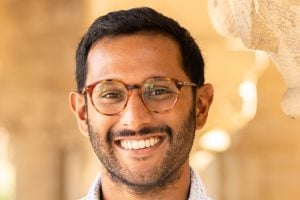
Meet new faculty member Abhishek Cauligi, assistant professor and principal investigator in the Autonomous Control & Exploration (ACE) Lab, who joined the Johns Hopkins faculty in fall 2025. His research leverages nonlinear optimization, machine learning, and control theory to advance autonomous space exploration.
What inspired you to pursue space engineering as a discipline?
At Michigan, I had a few experiences that shaped my interests in the field of guidance navigation and controls (GNC). Specifically, I interned on the GNC teams at a few different aerospace companies, and what I really enjoyed about GNC was how it’s the “brain” of a spacecraft and how the engineers were responsible for designing the software and hardware that determines how the system actually moves. After starting my PhD, I worked on the same questions on spacecraft GNC, but for free-flying robots that operate inside the International Space Station. The question there was: “How do we design algorithms that allow these robots to work alongside and help astronauts?” That was a great experience, as I had the chance to run experiments on the International Space Station with NASA’s Astrobee free-flying robot and show how the algorithms we developed using machine learning-based control could be used to operate these robots more effectively and autonomously.
After grad school, I worked at the NASA Jet Propulsion Lab (JPL) in the robotics section for three years, where I had the chance to actually take a lot of the research I did in grad school and apply it to flight projects. At JPL, my main project was a future Lunar rover mission known as CADRE (Cooperative Autonomous Distributed Robotic Exploration).
What are your main areas of expertise/interest/research? Is there a specific problem you are trying to solve?
My primary research interests are in understanding how we can design spacecraft and robots with the intelligence they need to be able to explore farther out into the solar system. As a part of this, I draw on tools from the fields of optimization, machine learning, and controls to develop new algorithms for robot planning and decision making. My focus is on studying problems where we have robots interacting with their surroundings and understanding how they can work safely under the uncertainty encountered in new environments.
Just to give a concrete example, on the CADRE project I worked on at JPL, we developed novel optimization-based planning algorithms to guide a team of multi-agent Lunar rovers to one day map out the subsurface of the moon. In my lab, we’ll be looking at similar problems, but understanding how we can make these systems more capable by incorporating ideas from reinforcement learning and machine learning.
What are some of your goals at JHU?
My lab’s focus at Hopkins will be fundamentally studying how to develop the autonomous decision-making capabilities needed for the next generation of space exploration. A big part of this will be in understanding how to safely combine machine learning-based algorithms with more classical aerospace planning and control techniques, and providing formal safety assurances for the system—how well do these algorithms work in environments we never trained it on, and how far can we push these systems in extreme and remote environments?
One of the reasons I’m really excited to be at Hopkins is the strong research in robotics that already exists and the opportunity to combine that expertise and work with collaborators at the Applied Physics Laboratory. Being able to work on my research questions with spaceflight experts is incredibly exciting.
Outside of teaching and mechanical engineering in general, what are your other interests? Any favorite films, music, books, etc.?
I love hiking, so I try to find ways to spend time outdoors as much as possible.
I’m also a film buff and enjoy watching movies from all over the world. My interest in working specifically in the space domain really does come from watching Star Wars, (regrettably Episode II: Attack of the Clones, which is not one of the good ones), but that’s how I became interested in space when I was young.
Where did you grow up, and where did you live before Baltimore?
I grew up in Northern Virginia, so I’m kind of local. I did my undergrad at the University of Michigan and spent almost a decade in California after that, between my PhD in the Bay Area and then working in Los Angeles before starting my role at Hopkins.